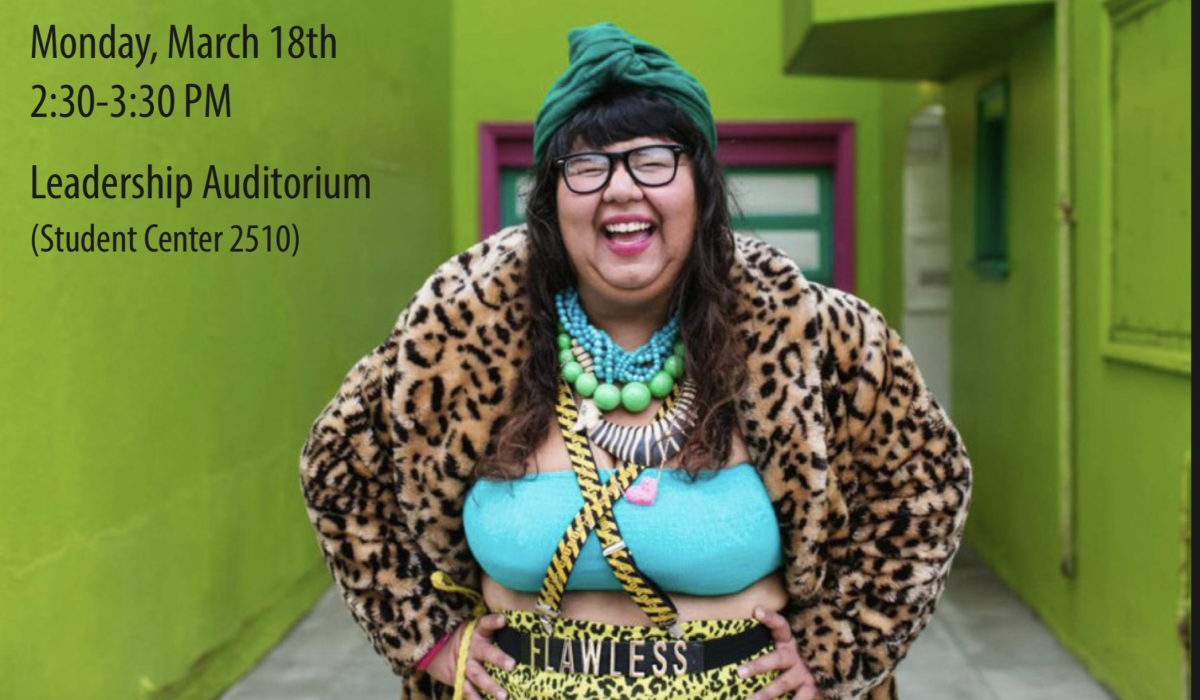Virgie Tovar held a speaking engagement event called “Lose Hate Not Weight: An Intersectional Feminist Approach to Diet Culture,” where she discussed the fact that American ideas about weight are a social construct. She urged audience members to look at how other cultures view weight in order to understand their biases.
Tovar was invited by the Center for Body Image Research and Policy through MU and spoke in the Leadership Auditorium in the MU Student Center.
Tovar spoke about educating and discussing fat discrimination and body image. She is an author, activist and one of the nation’s leading experts on the topic of body discrimination in American culture. She currently contributes to Forbes Magazine a weekly column on Ravishly called “Take the Cake.” She also has a 2017 TED Talk on the topic.
During the event at MU, Tovar presented an explanation of the term “fatphobia” and centered her engagement around the ramifications surrounding the word. She said that “fatphobia” is prevalent in American society as people are taught from a young age that being fat is bad.
“Our implicit bias shapes the way we see the world around us,” Tovar said.
Amber Karnes, founder of Body Positive Yoga, a yoga studio that promotes self-love, interviewed Tovar on her area of expertise. Karnes said she appreciates Tovar’s notion that there are different forms of self-discrimination, and that American societal standards are embedded in a discreet manner.
“I loved what you said about how there is this spectrum of self-hate,” Karnes said to Tovar. “And I think with diet culture, there is this really insidious way of telling us that we aren’t good enough. It’s almost an innate world view that you have to buy into diet culture.”
During Tovar’s discussion, she referenced anthropologists who did ethnographies in various regions in Africa. In these regions, women go to extreme measures to gain fat as it is considered the ideal form of feminine beauty. She notes that it is essentially opposite from American ideals, proving that beliefs surrounding body image are a social construct.
She also delved into her own past experiences regarding her personal body image. She noted that it was difficult to see that losing weight was not the solution to her happiness. She mentioned periods of starvation she believed would bring her success, love and visibility. She eventually grew to understand the depth of the topic and came to love her body.
After the event, Tovar discussed what prompted her to be outspoken regarding body discrimination.
“Discrimination against fat people is a really big form of injustice, and since I have the academic background, I was like, ‘Wow, I can help people understand this issue with my background,’” Tovar said.
Tovar also said discussing the issue of fat discrimination as a social construct rather than an innate fact is helping shed light on the construct as the root of the issue.
“I think a lot of people see it just as an ‘on the ground’ issue, but it’s actually, as you can see, a big issue that’s spanned a lot of years,” Tovar said. “I feel like we need to get people to be able to talk about what’s happening on the ground level to be able to talk about this as a cultural story.”
Chris Sandel, host of Real Health Radio, a prominent radio station in the UK, interviewed Tovar and discussed her openness to the word “fat.” He said it’s difficult for himself to use the word as comfortably as Tovar uses it.
“It is something I’m coming around to but I have some uneasiness using the word because it isn’t something I identify with,” Sandel said. “But the more people talk about it, the more it makes sense and I see the problem with using words like overweight, because as you say, ‘Who gets to judge over what?’”
Tovar also said it isn’t difficult to share her personal stories and discuss the topic of body image publicly.
“Doing this doesn’t exactly feel vulnerable,” Tovar said. “I mean it’s weird. It only feels vulnerable if I feel like I’m being attacked. But I kind of presume that people are on my side and that people who hate my guts are the minority.”
Tovar said the audience responded positively to her speaking engagement at MU and she has a good relationship with her general audience as well, which consists of predominantly women who want to listen and engage in conversations about body discrimination in American culture.
_Edited by Janae McKenzie | [email protected]_








